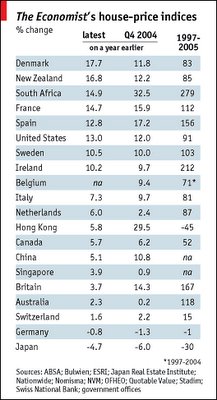Real Estate Finance & Economics in the New York Times, the Economist, and Business Week (and a few words about Zillow)
Today's edition of the New York Times Magazine was devoted mostly to real estate. Three articles of interest for readers of the Econophysics Blog are: the Freakonomics column by Steven Levitt (an economist at the University of Chicago) & Stephen Dubner -- Endangered Species, a profile of Harvard economist Edward Glaeser -- Home Economics, and a polemic on the mortgage interest deduction by Roger Lowenstein -- Who Needs the Mortgage-Interest Deduction?
Another interesting resource related to all of this is the Freakonomics supplement to the column. It has links to original sources (including some interesting pieces of empirical research) and other resources for those interested in learning more about the workings of real estate finance and economics (and where it all might be heading).
The Economist , in last Thursday's (March 2) issue, published its annual global house price index (see diagram below for a sample from the index). The Economist has generally taken a pessimistic view of the rise in home prices (they subscribe to the 'real estate bubble' school of thought). The article in question makes a persuasive case that -- even without a bursting of the bubble -- problems can arise due to the run up in prices.
, in last Thursday's (March 2) issue, published its annual global house price index (see diagram below for a sample from the index). The Economist has generally taken a pessimistic view of the rise in home prices (they subscribe to the 'real estate bubble' school of thought). The article in question makes a persuasive case that -- even without a bursting of the bubble -- problems can arise due to the run up in prices.

Business Week has an article showing data that indicates there are regional disparities in home prices even though the aggregate national data shows an overall gain in prices.
has an article showing data that indicates there are regional disparities in home prices even though the aggregate national data shows an overall gain in prices.
One development that I believe might prove to be revolutionary is Zillow.com -- a website that provides a model that purports to help people to quantitatively assess the value of real estate. It uses a sophisticated algorithm presumably based on statistical / econometric analysis of real estate values (which it calls the "Zestimator"). One of the main reasons people use real estate agents is because -- as middlemen with proprietary sources of information helpful in the valuation of properties -- their 'expertise' is presumably needed in properly assigning a price to real estate (either as a bid price or as an asking price). A resource like Zillow may help to reduce the power that real estate agents have over valuation issues. This is important -- according to econometric research done by Steven Levitt and others -- because real estate agents use their influence in pricing to the detriment of those they represent (and for their own gain when they represent themselves in real estate transactions).
I'm planning on having more to say about Zillow and real property valuation issues sometime in the near future. Stay tuned.
Another interesting resource related to all of this is the Freakonomics supplement to the column. It has links to original sources (including some interesting pieces of empirical research) and other resources for those interested in learning more about the workings of real estate finance and economics (and where it all might be heading).
The Economist

Business Week
One development that I believe might prove to be revolutionary is Zillow.com -- a website that provides a model that purports to help people to quantitatively assess the value of real estate. It uses a sophisticated algorithm presumably based on statistical / econometric analysis of real estate values (which it calls the "Zestimator"). One of the main reasons people use real estate agents is because -- as middlemen with proprietary sources of information helpful in the valuation of properties -- their 'expertise' is presumably needed in properly assigning a price to real estate (either as a bid price or as an asking price). A resource like Zillow may help to reduce the power that real estate agents have over valuation issues. This is important -- according to econometric research done by Steven Levitt and others -- because real estate agents use their influence in pricing to the detriment of those they represent (and for their own gain when they represent themselves in real estate transactions).
I'm planning on having more to say about Zillow and real property valuation issues sometime in the near future. Stay tuned.


0 Comments:
Post a Comment
<< Home